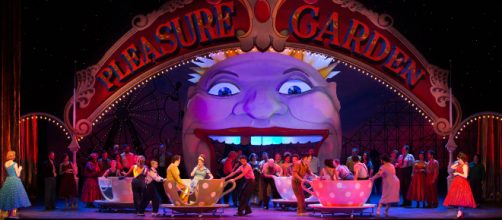In 1790, at the peak of his creative powers and in the year before his premature death, Wolfgang Amadeus Mozart composed the sophisticated, playful drama that is "Così fan tutte" (roughly translated: Women Are All Alike). A symmetrically balanced, two-act opera, it is essentially a sextet with the occasional chorus. Yet it proves that—when it’s Mozart—the less-is-more approach can be deeply satisfying. Metropolitan Opera has unveiled its new Phelim McDermott production with an updated setting. At a heavily sold performance Tuesday, March 20, California conductor David Robertson led the Metropolitan Opera Orchestra and Chorus along with an international cast of soloists; tenor Ben Bliss and sopranos Amanda Majeski and Kelli O’Hara, from the United States, Czech bass-baritone Adam Plachetka, English baritone Christopher Maltman, and Italian mezzo-soprano Serena Malfi.
The look of ‘Così’
Director Phelim McDermott’s co-production with English National Opera updates the action to 1950s Coney Island. Tom Pye’s sets feature, against the horizon, both Thunderbolt (the historic roller coaster) and The Wonder Wheel (an improvement on the then-new Ferris wheel), aptly suggesting the amusement park ambiance. Lighting designer Paule Constable deftly silhouettes the Ferris wheel and roller coaster at sundown, complete with a subtly blazing sunset of burnt orange. Costume designer Laura Hopkins’ creations evoke those happy days, in both formal and casual wear, right down to the saddle shoes.
Leading men
Ben Bliss is more than a “tenore di grazia.” His agile voice has all the warmth and none of the tightness sometimes associated with Ferrando’s music.
He negotiates the long, heavily embellished lines as if second nature with gorgeous tone and sterling clarity. As Guglielmo, performed by Adam Plachetka, sings suavely and, when called for, blusters effectively. His Act-II aria avoids becoming just a monotonous rant, balancing indignation with macho swagger. Christopher Maltman—a well-known Guglielmo himself, now having a turn as the cynical, scheming Alfonso—has a voice that makes you wish Mozart had come up with a proper aria or two for his character.
Ben Bliss sings Ferrando’s Act I aria, Un’aura amorosa, in the final dress rehearsal of @MetOpera's new production of Così fan tutte, which will be transmitted LIVE in HD to 30 Irish venues nationwide on 31-March 2018. Tix: https://t.co/vv22KHr7uqhttps://t.co/R8KOisn8mp
— Classical Arts Irl (@ClassicalArts) 23 March 2018
Array of ladies
Amanda Majeski clearly owns the role of Fiordiligi, her duets with Dorabella elegant and playful, her duet with Ferrando riveting, and both arias sung fully embellished with interpolated ornaments and even real trills.
Serena Malfi’s melting mezzo is never more sensuous than in Dorabella’s duet with Guglielmo, “Il core vi dono” (I Give You My Heart). Tony Award-winning Broadway star Kelli O’Hara credibly transitions to the opera stage with a lovely authentic soprano voice, necessary resonance, and some fine acting chops. As the worldly-wise Skylight Motel housekeeper, Despina, she beautifully dispatched both her arias and made a quick recovery on a couple flubbed lines of dialogue, sung in this high-speed, text-heavy role as recitative.
Praised by @nytimes for her “lustrous, focused voice,” Amanda Majeski opened the new production of Così fan tutte at @MetOpera last night, creating “stage magic” singing her Act II aria suspended midair, a nod to the Coney Island circus-inspired production https://t.co/GLYez0gBjk pic.twitter.com/oJHSfA6xIq
— Columbia Artists (@ColumbiaArtists) 16 March 2018
Chorus and Orchestra underpinning
Only 20 or so members of Metropolitan Opera Chorus appear, yet they prove ample for the crowd scenes and offstage numbers at the three pivotal plot points.
Maestro David Robertson keeps things tightly together—no little task in Mozart, with a million things happening each moment, especially in the extended finales of each act. The Orchestra plays this ingenious score splendidly.
Why see ‘Così’
Mozart’s sublime music is the number-one reason to head to the Met. Let the sonic wonders of the score wash over you. Foremost among them is the Act-I trio “Soave sia il vento” (May the Winds Be Calm), Fiordiligi and Dorabella’s heartfelt bon voyage to their intendeds, with Don Alfonso’s sympathetic support. Such harmony. Such intertwining melodies. This is just one of various trios. (Act I opens with three trios in a row!) The opera quickly unfolds through a supple series of ten arias, several duets, quartets, quintets, and sextets—all of it mind-boggling, none of it disappointing.
Love is complicated
The story, though farfetched, is compelling: Ferrando and Guglielmo, two officers who are friends, are to marry two sisters, Fiordiligi and Dorabella. Don Alfonso bets that the young women will quickly fall for other eligible bachelors who come to pay suit, and he gets Despina in on the scheme. All bets on, the officers are suddenly called away by the military. After departing, they return in disguise and woo each other’s fiancée. All is harmless amusement, the officers think - until the young ladies begin to waver. Lots of angst erupts in the midst of this playful work (dramma giocoso). This production does not disguise the guys in ridiculous garb, but in jeans, leather jackets and subtle mustaches.
That the sisters don’t recognize them merely requires the audience to suspend disbelief. Comedy becomes dramedy, and the end is always unsettling.
Twelve reasons more
Metropolitan Opera has hired a 12-member skills ensemble made up of actual sideshow performers, some of whom work at Coney Island. Throughout the opera, they demonstrate their prowess, whether it’s swallowing swords, eating fire, contorting or even handling a large live boa constrictor. They help with the numerous split-second scene changes, lending fluidity to the story and keeping things moving. They are: Betty Bloomerz, Nicholas DeCegli, Sarah Folkins, Leo the Human Gumby, Jonathan Nosan, Titano Oddfellow, Cristina Pitter, Sage Sovereign, Ray Valenz, Anna Venizelos, Josh Walker, and Zoe Ziegfeld.
Switch over to our Instagram story this evening as we go backstage before the show to visit a few members of the #Cosìfantutte Skills Ensemble! https://t.co/7NVhgo0Cxd pic.twitter.com/pbZJ6kiWhJ
— Metropolitan Opera (@MetOpera) 20 March 2018
"Così fan tutte," by Wolfgang Amadeus Mozart, till April 19, Metropolitan Opera, Lincoln Center, New York, New York.


